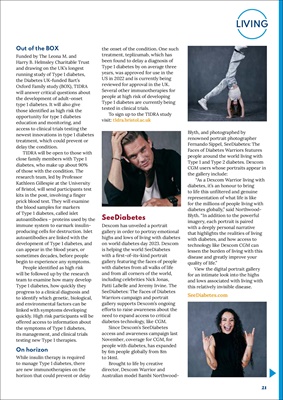
21
LIVING
Out of the BOX
Funded by The Leona M. and
Harry B. Helmsley Charitable Trust
and drawing on the UK's longest
running study of Type 1 diabetes,
the Diabetes UK-funded Bart's
Oxford Family study (BOX), T1DRA
will answer critical questions about
the development of adult-onset
type 1 diabetes. It will also give
those identified as high risk the
opportunity for type 1 diabetes
education and monitoring, and
access to clinical trials testing the
newest innovations in type 1 diabetes
treatment, which could prevent or
delay the condition.
T1DRA will be open to those with
close family members with Type 1
diabetes, who make up about 90%
of those with the condition. The
research team, led by Professor
Kathleen Gillespie at the University
of Bristol, will send participants test
kits in the post, involving a finger
prick blood test. They will examine
the blood samples for markers
of Type 1 diabetes, called islet
autoantibodies - proteins used by the
immune system to earmark insulinproducing
cells for destruction. Islet
autoantibodies are linked with the
development of Type 1 diabetes, and
can appear in the blood years, or
sometimes decades, before people
begin to experience any symptoms.
People identified as high risk
will be followed up by the research
team to examine how many develop
Type 1 diabetes, how quickly they
progress to a clinical diagnosis and
to identify which genetic, biological,
and environmental factors can be
linked with symptoms developing
quickly. High risk participants will be
offered access to information about
the symptoms of Type 1 diabetes,
its management, and clinical trials
testing new Type 1 therapies.
On horizon
While insulin therapy is required
to manage Type 1 diabetes, there
are new immunotherapies on the
horizon that could prevent or delay
the onset of the condition. One such
treatment, teplizumab, which has
been found to delay a diagnosis of
Type 1 diabetes by on average three
years, was approved for use in the
US in 2022 and is currently being
reviewed for approval in the UK.
Several other immunotherapies for
people at high risk of developing
Type 1 diabetes are currently being
tested in clinical trials.
To sign up to the T1DRA study
visit: t1dra.bristol.ac.uk
Blyth, and photographed by
renowned portrait photographer
Fernando Sippel, SeeDiabetes: The
Faces of Diabetes Warriors features
people around the world living with
Type 1 and Type 2 diabetes. Dexcom
CGM users whose portraits appear in
the gallery include:
"As a Dexcom Warrior living with
diabetes, it's an honour to bring
to life this unfiltered and genuine
representation of what life is like
for the millions of people living with
diabetes globally," said NorthwoodBlyth.
"In addition to the powerful
imagery, each portrait is paired
with a deeply personal narrative
that highlights the realities of living
with diabetes, and how access to
technology like Dexcom CGM can
lessen the burden of living with this
disease and greatly improve your
quality of life."
View the digital portrait gallery
for an intimate look into the highs
and lows associated with living with
this relatively invisible disease.
SeeDiabetes.com
SeeDiabetes
Dexcom has unveiled a portrait
gallery in order to portray emotional
highs and lows of living with diabetes
on world diabetes day 2023. Dexcom
is helping the world SeeDiabetes
with a first-of-its-kind portrait
gallery featuring the faces of people
with diabetes from all walks of life
and from all corners of the world,
including celebrities Nick Jonas,
Patti LaBelle and Jeremy Irvine. The
SeeDiabetes: The Faces of Diabetes
Warriors campaign and portrait
gallery supports Dexcom's ongoing
efforts to raise awareness about the
need to expand access to critical
diabetes technology, like CGM.
Since Dexcom's SeeDiabetes
access and awareness campaign last
November, coverage for CGM, for
people with diabetes, has expanded
by 6m people globally from 8m
to 14m1.
Brought to life by creative
director, Dexcom Warrior and
Australian model Bambi Northwood-